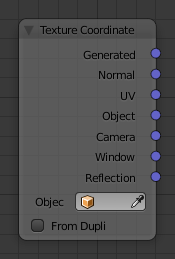Node Texture Coordinate¶

Node Texture Coordinate.¶
Le node Texture Coordinate est habituellement utilisé pour les coordonnées de textures, utilisées typiquement comme entrées pour l’entrée Vector des nodes texture.
Entrées¶
Ce node n’a pas d’entrées.
Propriétés¶
- Object
Objet spécifique à utiliser pour les coordonnées d’espace d’objet. Ceci n’affecte que la sortie Objet.
- From Instancer Cycles Only
If the object is generated by instancing from vertices or faces, use texture coordinates from instancer. This only affects the Generated and UV outputs.

From left to right: Sphere with a UV-mapped texture. Small spheres instanced to the faces of the textured sphere using instancing from faces. Small spheres with From Instancer enabled, using the UV map of the large sphere.¶
Note
From Instancer ne fonctionne qu’avec la sortie UV quand l’objet est instancié soit à partir de particules ou de faces.
Sorties¶
- Generated
Automatically-generated texture coordinates from the vertex positions of the mesh without deformation, keeping them sticking to the surface under animation. Range from 0.0 to 1.0 over the bounding box of the undeformed mesh. See Texture Spaces for more information.
- Normal
Object space normal, for texturing objects with the texture staying fixed on the object as it transformed. The Normal output can be used on Point and Spot lights. The coordinates will take the rotation of the light into account.
- UV
Coordonnées de texture UV de l”UV map de rendu actif. Voir UV Mapping pour plus d’informations.
Note
Pour sélectionner un UV map autre que le map actif, vous devez utiliser le node UV Map.
- Object
Uses an object as a source for coordinates. Often used with an empty, this is an easy way to place a small image at a given point on the object. This object can also be animated, to move a texture around or through a surface.
- Camera
Coordonnée de position dans l’espace caméra.
- Window
Position du point d’ombrage sur l’écran, dans l’intervalle de 0.0 à 1.0 de gauche à droite et de bas en haut du rendu. C’est bien adapté pour combiner deux objets.
- Reflection
Utilise la direction du vecteur de réflexion comme coordonnées. C’est utile pour ajouter des maps de réflexion. Vous aurez besoin de cette entrée à l’utilisation d”environment maps.